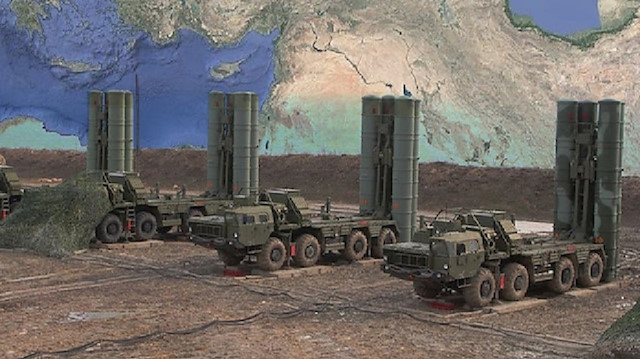
Russian experts discuss results of this week's Russian-Turkish presidential meeting at roundtable
Turkey is not the first NATO country to buy the S-400 air defense system, according to a Russian military expert.
Speaking at a Tuesday roundtable meeting on “Russian-Turkish Relations and Regional Security: Erdogan's visit to Moscow,” after Turkish President Recep Tayyip Erdogan's visit to Moscow this week, Vladimir Yevseyev told how Greece was the first NATO country to buy the system and it was not criticized or sanctioned for that.
“If Greece buys it, Turkey can also buy the S-400 system. Turkey has the right to be independent of the U.S. on the issue of weapons purchases,” he said.
According to Yevseyev, the S-400 system surpasses the U.S. Patriot air defense system on some parameters, including target detection.
Russia is also supportive of Turkey’s desire to produce these kinds of systems, he said.
“Turkey is trying to produce the weapons independently. Russia and Turkey can develop joint production of armaments,” he said.
Also at the roundtable, Grigory Lukyanov, a professor at the Moscow-based Higher School of Economics, added that Turkey needs the S-400 to protect its territory.
“The solution to the Syrian problem depends on Idlib [in northwestern Syria], and a solution to the Kurdish question on the establishment of a constitutional committee,” he said, adding that the Syrian problem would be solved by implementing recommendations worked out in the Astana format.
Meeting this week in Moscow, Erdogan and Russian President Vladimir Putin showed they are ready to work together, Lukyanov said.
He also suggested that U.S. actions in Syria helped Russia and Turkey bring their positions on the Syrian issue closer.
Victor Nadin-Rayevsky, head of the Institute for Political and Social Studies of the Black Sea and Caspian Region, called Russian-Turkish disputes on a number of issues “normal.”
Disputes over gas prices are normal, as a buyer always tries to buy cheaper and a seller tries to sell at a higher price, he said.
“Turks know how to count money and negotiate. At the same time, Russia can't sell gas below cost. On this issue, both countries have to balance their interests,” he said.
On complaints about lower exports of Turkish tomatoes, he said it was impossible to return to previous volumes -- before last year’s lifting of sanctions -- because Russia does not need tomatoes in the same quantity.
In general, the results of the talks were very positive, said Amur Gadzhiev, head of the Modern Turkey Research Centre.
The fact that Erdogan made his first visit after Turkey's March 31 local elections to Russia shows the high level of Russian-Turkish relations, he said.
“The focus wasn’t on quantity but on quality. The parties avoided stock phrases. It was specifics. They discussed not only desired goals, but also opportunities, methods and means to achieve goals in industry, metallurgy, agriculture, high technology, and other areas,” Gadzhiev said.
The parties’ desire to bring bilateral relations to “a qualitatively new level” was evident. The strategic nature of bilateral relations was repeatedly mentioned in various contexts, he said.
Gadzhiev said the leaders of the two countries held a common understanding that good relations between Turkey and Russia would help solve many problems including the Syrian crisis.


